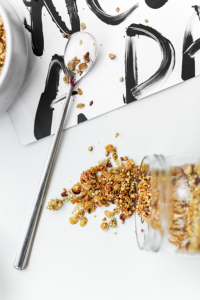
Despite what you may think, all “healthy” foods are not created equal. The food industry has spent billions of dollars on marketing certain foods that claim to be “healthy”. And unless you are doing your own research on food nutrition and food science, you are likely falling prey to this form of information dissemination. So we want to share a list of what not to eat after bariatric surgery.
As a bariatric dietitian, I see patients all the time who complain of weight regain or weight loss stalls after bariatric surgery. The first question I ask them is, “What are you eating?”. I find that many patients are actually indulging in these “healthy” snacks that are inhibiting their weight loss goals. Although most of the foods they are eating are nutrient-dense, they are not appropriate for a bariatric patient focused on a low-carb and high-protein meal plan, so here is a list of what not to eat after bariatric surgery and “healthy” foods to avoid.
What Not to Eat after Bariatric Surgery
1. Nuts
Nuts are antioxidant (free radical fighters that prevent damage to cells) powerhouses! So why are they marked as unhealthy? Well, they are very calorie-dense. A small number of nuts adds up to a lot of calories. For example, ¼ cup of almonds has over 200 calories. Not many people eat that few amounts of nuts in a serving. Also, nuts, and especially nut butter, are slider foods. They don’t fill the stomach and instead are digested quickly, causing hunger spikes earlier on.
2. Smoothies

These are known to be quick and easy post-workout or on-the-go snacks. Smoothies have been marketed as “healthy” because they are loaded with fruit (and sometimes veggies). However, what we teach in our bariatric program is fruit is sugar. Yes, natural sugar, but still sugar.
When you blend a bunch of fruit together, it’s easy to devour more calories without getting the same full feeling you would get from eating the fruit whole—this is primarily a result of stripping away some of the fiber. And fiber is an important component when it comes to feeling full. Therefore, I recommend eating whole fruit to maximize the benefits.
3. Granola
Granola may seem like a nutritious go-to for breakfast or as a snack, but contrary to the belief, granola is not a good bariatric option. Granola has a lot of carbs and usually added sugars. Some granola contains nuts, dried fruit, and even chocolate. One-fourth cup of granola has 140 calories, which mostly comes from carbs. And like nuts, you are probably having more than one serving of granola due to the small serving size.
4. Dried fruit
As I mentioned above, fruit is mostly comprised of sugar. When dried, the volume reduces, but calories stay the same. When eaten, you do not get as full in comparison to when eating whole fruit. So you’ll likely consume more than three apples when dried compared to ½ – 1 apple when whole.
5. Whole grain anything
We have been taught that whole grains are a healthier choice when choosing your carb due to the fiber content; We know that fiber can lead to fewer spikes in blood sugar and increased satiety. However, whole grain bread, whole grain pasta, and brown rice have the same amount of carbs and calories parallel to white foods. Containing the flour of multiple grains does not mean containing the whole grain. When the grains are milled and processed, natural antioxidants and fiber content are reduced. If eating wheat instead of white, look for “100% whole grain or 100% whole wheat” as the first ingredient.
6. Oils
Oils, such as olive oil and coconut oil, have been a buzzword for all keto-goers and low-carb eaters. Bulletproof coffee (adding 1-2 tablespoons of butter to coffee) blows my mind. Yes, oils have excellent cardiovascular health benefits, but oils are high in calories for a small amount – again, very calorie-dense. Therefore, you want to try to limit your oil and fat intake. When cooking with oils or using them as dressing, stick to a thumb-size portion.
This list of what not to eat after bariatric surgery need to be a limited part of your diet. You do not need to stay completely away from these foods, but you want to be sure to limit your intake of them, especially if you are not moderately active and therefore in need of a higher-carb diet.













